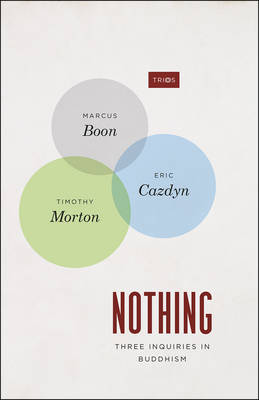
Stock image for illustration purposes only - book cover, edition or condition may vary.
Description for Nothing
Paperback. Series: TRIOS. Num Pages: 296 pages. BIC Classification: HRE. Category: (G) General (US: Trade). Dimension: 213 x 140 x 18. Weight in Grams: 318.
Though contemporary European philosophy and critical theory have long had a robust engagement with Christianity, there has been no similar engagement with Buddhism-a surprising lack, given Buddhism's global reach and obvious affinities with much of Continental philosophy. This volume fills that gap, bringing together three scholars to offer individual, distinct, yet complementary philosophical takes on Buddhism. Focused on nothing -essential to Buddhism, of course, but also a key concept in critical theory from Hegel and Marx through deconstruction, queer theory, and contemporary speculative philosophy-the book explores different ways of rethinking Buddhism's nothing. Through an elaboration of sunyata, or emptiness, in both critical and Buddhist traditions; an examination of the problem of praxis in Buddhism, Marxism, and psychoanalysis; and an explication of a Buddaphobia that is rooted in modern anxieties about nothingness, Marcus Boon, Eric Cazdyn, and Timothy Morton open up new spaces in which the radical cores of Buddhism and critical theory are renewed and revealed.
Product Details
Publisher
The University of Chicago Press United States
Number of pages
296
Format
Paperback
Publication date
2015
Series
TRIOS
Condition
New
Weight
373g
Number of Pages
296
Place of Publication
, United States
ISBN
9780226233260
SKU
V9780226233260
Shipping Time
Usually ships in 7 to 11 working days
Ref
99-50
About Marcus Boon
Marcus Boon is professor of English at York University in Toronto. Eric Cazdyn is the Distinguished Professor of Aesthetics and Politics at the University of Toronto. Timothy Morton is the Rita Shea Guffey Chair in English at Rice University in Houston, Texas.
Reviews for Nothing
A serious and significant engagement with critical theory and Buddhism.
Speculative Non-Buddhism Nothing's overarching contribution clarifies the problematics of Buddhist critical theory as the intra-active, performative effects of a mutualizing ethico-ontoepistemology. This invites critical mindfulness of the immediate existential-material circumstances that may at once inspire and constrain any given attempt/location of Buddhist critical theory.
Religious Studies Review I have contemplated and endured 'nothing' for so long that it did not seem right to break my practice or offer other readers something like insight, possibly a moment of sense making and affirmation. But I break out of my trance to assert the emphatic necessity of this book, so erudite without loading us down, relentless in its ability to resignify. Sassy, brilliant, a genuine engagement with and of thought, this work tunes us to a thrilling, endorphinating way of thinking: my drug of choice.
Avital Ronell, New York University Nothing is wide-ranging, and the essays are rich and well researched, drawing on all sides, including analytic philosophical approaches to Buddhism.
Choice The reader will delight in two important aspects of Nothing a multitude of contemporary Buddhist responses to the great political and social changes that have affected Asian countries
imperialism, colonialism, communism, corporate capitalism
and rigorous elaboration of Lacanian psychoanalysis with Buddhist psychology. This book is exceptional.
Alphonso Lingis, Pennsylvania State University
Speculative Non-Buddhism Nothing's overarching contribution clarifies the problematics of Buddhist critical theory as the intra-active, performative effects of a mutualizing ethico-ontoepistemology. This invites critical mindfulness of the immediate existential-material circumstances that may at once inspire and constrain any given attempt/location of Buddhist critical theory.
Religious Studies Review I have contemplated and endured 'nothing' for so long that it did not seem right to break my practice or offer other readers something like insight, possibly a moment of sense making and affirmation. But I break out of my trance to assert the emphatic necessity of this book, so erudite without loading us down, relentless in its ability to resignify. Sassy, brilliant, a genuine engagement with and of thought, this work tunes us to a thrilling, endorphinating way of thinking: my drug of choice.
Avital Ronell, New York University Nothing is wide-ranging, and the essays are rich and well researched, drawing on all sides, including analytic philosophical approaches to Buddhism.
Choice The reader will delight in two important aspects of Nothing a multitude of contemporary Buddhist responses to the great political and social changes that have affected Asian countries
imperialism, colonialism, communism, corporate capitalism
and rigorous elaboration of Lacanian psychoanalysis with Buddhist psychology. This book is exceptional.
Alphonso Lingis, Pennsylvania State University
